|
|
Post by pjotr on Jan 5, 2016 17:51:33 GMT 1
Dear friends,
Last weekend (Friday evening and Saturday) I received a Syrian guest who is a Syrian refugee, who lives in a Syrian refugee center in Nijmegen. An Amsterdam friend of mine went to Nijmegen to drive my Syrian guest to Arnhem.
We spend the evening and saturday together and it was my first personal encounter with a Syrian refugee in Europe. This is different than filming a news flash and etc.
My Amsterdam friend said that I know a lot about Syria and that it would be probably an interesting encounter, because I have stuf to discuss about. And we had something to talk about. My Syrian friend at and drank with us and we walked around in the city of Arnhem and it's most beautiful park Sonsbeek.
You know that I am humble about my knowledge of Syria and thew Middle east. And I repeat I have never been to Syria personally. I only know a female colleague who went there before the terrible Syrian civil war.
She said that Aleppo was very beautiful, she spoke Arabic (learnt it herself after 911), and she wrote about it in her Dutch language, personal cultural travel blog.
In my discussion with my Syrian guest I used my knowledge of history books, encyclopedia - Britannica and Wiki-, newspaper and magazine article and essay, TV documentary
and interviews knowledge (of Al Jazeera, Al Arabiya, Al Manar - the Hezbollah news chanal, Syrian state news chanal, RT, Al Arabiya English, I24, Haaretz, BBC, CNN, Fox news,
my own Dutch NOS, NPS, VPRO, AVRO/TROS, NCRV/EO and the Commercial RTL Nieuws chanal, the Belgian Flemish TV, the German ZDF, ARD and WDR newschanals, Der Spiegel Online, Karl's stories - I read and remembered-, Euronews, Press tv (=Iranian English chanal) and Polish Radio.
I was very curious and exited about my guest and wondered what we will talk about. We talked about Syria, his Druze people, faith and culture. About Sunni-Muslims, Shia-Muslims, Christians in the Middle-east, and Druze in Syria, Lebanon and Israel.
Cheers,
Pieter
|
|
|
|
Post by pjotr on Jan 5, 2016 17:52:17 GMT 1
Dear Bonobo and Jeanne, It was a very interesting and learnative experience. The young man is a Syrian Druze from Southern-Syria. He is mildly Pro- Bashar Hafez al-Assad, and very anti-Daesh ( Islamic State), Al Nusra Front and Free Syrian Army. He told me about the intolerance, hatred and threats of Sunni-Muslim Syrians against Druze, Allawite, Christian and Kurd Syrians. But in the same time told me that a lot of Sunni-Muslim Syrians also support the Syrian Baath Party regime of Bashar Hafez al-Assad, because they don't like the Muslim Brotherhood, Daesh ( Islamic State) and the Al Nusra Front. What was interesting was that he told me that a lot of Arab states and Arab people don't like Palestinians. He mentioned the case of Kuwayt, Lebanon, Jordan, Iraq, Syria and other places, where the Palestinians in the view of the Kuwayt Arabs, Lebanese Arabs, Jordan Beduin Arabs and Syrian arabs supported the wrong party. My Druze friend finds the Palestinians illogical and ungrateful. The Syrian regime supported the Palestinian cause for decades and now the Palestinians in Syria have turned themselves against Syria (or the Syrian regime). He couldn't find the logic in that. My friend was critical of aspects of the Syrian regime and believed that certain things have to change. But he said that it would be a disaster if Bashar Hafez al-Assad would leave and the Baath party regime would collapse. Syria would descent into Anarchy, and the lives of Druze people, Allawites, christians, Kurds and moderate Sunni Muslims would be in danger. I also learned that there is a difference between Syrian Druze, Israeli Druze and Lebanese Druze. Lebanese Druze are hostile towards Syrian Druze because they are Syrian. My Druze Syrian friend was honest and said that the Syrian army and intelligence agencies have played a bad role in Lebanon during the Lebanese civil war and after that. They assasinated, abducted, killed and bombed Lebanese people. I also talked with him about Walid Jumblatt, the Lebanese Druze leader. My Syrian Druze friend called Walid Jumblatt a strong leader but also a flip flop, switching sides often. Being fiercly anti-Syrian, then Pro-Assad, then moderately opposed to the Syrians and then Pro-Syrian again.  Walid Jumblatt Walid JumblattMy Syrian Druze friend believes that Israel supports the Al Nusra Front in Syria to counter the influence of Hezbollah and Iran in that country. I can say that I find this thesis interesting, but I don't know if I believe it. It was an interesting evening. My Syrian guest and Amsterdam friend will sleep her over night. Tomorrow morning I will see them again. It was and is interesting to have a Syrian guest, and to hear a different perspective. Cheers, Pieter |
|
|
|
Post by pjotr on Jan 5, 2016 17:53:42 GMT 1
It is very nice to be able to talk with someone from the Middle East about the Middle East and his country Syria. I learn a lot from the conversations. He comes from As-Suwayda near the Jordanian border and near Daraa. It is a mainly Druze town with an Eastern-Orthodox minority and Sunni-Muslim Bedouin villages nearby. en.m.wikipedia.org/wiki/As-Suwayda |
|
|
|
Post by pjotr on Jan 5, 2016 17:54:16 GMT 1
My Syrian friend is a peaceful and polite man, but he said that the Western press and the Arab media do not tell the truth always. He saw me using Al Jazeera English and Al Arabiya English. And he immediately said. They don't tell the truth. It's distorted. Al Jazeera is from a Qatari perspective and Al Arabiya from a Saoudi perspective. My friend told me that before the Syrian civil war Syria wasn't completely democratic or free, but better than today. Hafez al-Assad was a strong leader in the eyes of my Syrian friend. He wouldn't allow any protest, dissident voices or criticism like his civilized, sophisticated and educated son Bashar al-Assad. My Syrian friend told me; "You have to realize that Bashar al-Assad is an intellectual, and a sophisticated man in the eyes of his supporters. Bashar al-Assad graduated from the medical school of Damascus University in 1988, and started to work as a doctor in the army. Four years later, he attended postgraduate studies at the Western Eye Hospital, in London, specializing in ophthalmology.  Hafez al-Assad Hafez al-Assad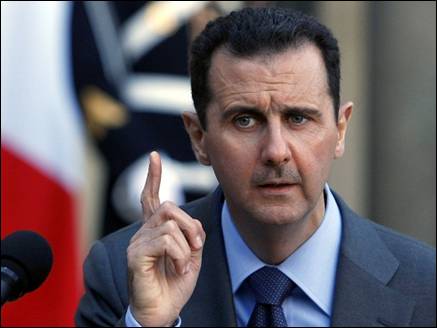 Bashar al-AssadBashar al-Assad Bashar al-AssadBashar al-Assad is different than Bassel al-Assad, the eldest son of the former Syrian President Hafez al-Assad and the older brother of President Bashar al-Assad. He was widely expected to succeed his father had it not been for his death in a car accident. Bassel al-Assad was more like his father Hafez al-Assad. Trained in parachute-jumping, Bassel al-Assad was commissioned in the Special Forces and later switched to the armored corps after training in the Soviet Military Academies. He rapidly became a major and then commander of a brigade in the Republican Guard. After Hafez Assad recovered from a serious illness in 1984, Bassel began to accompany his father in his visits.  Bassel al-Assad Bassel al-AssadIt was interesting to learn that Shia Muslims ( a tiny minority in Syria) and Allawites are less hostile towards Druze than the Sunni-Muslims who were -in the eyes of my Syrian Druze friend- indoctrinated by the Saoudi-, Qatari-, Algerian, Iraqi-, Chechen and other fighters from Daesh (Islamic State) and the Al-Nusra Front. My Druze friend believe that the so called Free Syrian Army doesn't exists anymore, and that the men of the ' so called' Free Syrian Army are Daesh fighters or Al Nusra Front fighters. And Daesh and the Al Nusra Front fighters fight against each other and other rebel groups. My Syrian Druze friend asked me the rhetoric question; " Have you ever asked yourself where Daesh comes from. Who is Daesh, who created Daesh?" Peope receive false, biased and deliberately distorched news from the Western (European and American press) and the Arab press. What is really going on in Syria? My Druze friend doesn't hate Palestinians or Sunni-Muslims, but he just pointed at the fact that Sunni-Muslims and Palestinians have always fought against each other and others. They fight against enemies and they fight against or betray allies (friends). Palestinians fought against each other in the War of the Camps during the Lebanese civil war. Palestinians fought against each other in Gaza (Hamas against Fatah) and Palestinians fight against each other in Syria now. On the Syrian government side the Popular Front for the Liberation of Palestine – General Command and on the rebel side the and the Liwa al-Asifa or Storm Brigade on the side of the rebels of the Free Syrian Army (I believe the Free Syrian Army exists, my Druze friend doesn't from his Southern perspective. Close to his town the Beduins and other Sunni-Muslims side with the Al-Nusra Front. en.wikipedia.org/wiki/War_of_the_CampsThe Druze have a more neutral stance in Syria than other groups. Due to their faith they don't side with anybody. But they protect their territory, their Druze temples and shrines, with armed Druze militia. Ofcourse there are also Druze in the Syrian army. And it is true that many Syrian Druze inside Syria and on the Israeli occupied Golan Heights are Pro-Assad (Pro-Baath party regime). Why, because the Takfiri Sunni-Muslim Islamist Jihadist fighters of Al-Nusra, Daesh (Islamic state) and the Islamic Front see Druze as infidels, unbelievers, non-Muslims and their for their enemies. These extremists kill all non-Salafist, Wahhabi sect fanatical Sunni Muslims. They want to cleanse Syria from Druze, Christians, Allawites, Shia, Yezdi and moderate Sunni-Muslims. My Syrian friend told me that Druze could get along with anyone in the Syria before the civil war. Druze could get along with Sunni's, Shia, Christians, Palestinians and etc. He told me that Palestinians in Syria have a different status. They are Syrians with a Palestinian nationality. He said that Palestinians and other minorities were treated very well by the Assad regime. Palestinians had rights for good homes, free health care, education, public transportation. The only difference was that their nationality and status was Palestinian and not Syrian. I have read many articles, and seen more documentaries in which I saw that Palestinians weren't popular in Arab countries. The Egyptians hate Hamas and are equally tough to Palestinians as Israeli's. Palestinian guestworkers are treated very badly in Saoudi-Arabia (Egyptian workers are treated as trash there too). My Syrian friend told me how bad Saoudi, Qatari, United Arab Emirate people and other Gulf Arabs treat foreign workers. They are treated like slaves. And he said; " Muslims have to help fellow Muslims, but the Saoudi's, Qatari and other Gulf Arabs don't help the Syrians and Iraqi's." My Syrian friend said to me; " I don't know why the Saoudi's hate us, but they do!" (Karl, you said earlier that Saoudi's hate Syrians. Why?) He repeated, we Druze don't hate anybody, we got along with many people. We are like the Bahai people of Iran. The Druze faith is secret, and it has elements of Judaism, christianity and Islam. That's why many Muslims see them as Kafirs. Kafir (Arabic: كافر kāfir; plural كفّار kuffār; feminine كافرة kāfirah) is an Arabic term (from the root K-F-R " to cover") used in an Islamic doctrinal sense, usually translated as " unbeliever," " disbeliever," or " infidel". It is used as a derogatory term. The term alludes to a person who rejects or disbelieves in God and the religious truth revealed through the mission of the Islamic Prophet Muhammad, and thus demonstrates ingratitude towards God; denies, refuses to accept the dominion and authority of God; or otherwise does not heed the beliefs and prescriptions held by the religion of Islam. Unbelief is called kufr. Kafir is sometimes used interchangeably with mushrik (مشرك, those who commit polytheism), another type of religious wrongdoer mentioned frequently in the Quran and Islamic works. The practice of declaring another self-professed Muslim a kafir is known as takfir. Before the war my Syrian friend visited Sunni Muslim Syrians in Daraa, Homs, Damascus or Aleppo. And he was welcome in their home as a fellow Syrian. Today that is impossible. He could get along with Allawites, christians, Palestinians, Kurds (but there are no Kurds in his region in Southern-Syria, but in other parts of Syria). There was no problem between different faiths, ethnicities, cultures. Sunni Muslims, Allawites, Assyrian Christians, Armenian christians, Shia Muslims, Syrian jews, Syrian Kurds, Syrian Nationalists, Syrian atheists, Syrian secularists and other Syrians could get along. The regime was strict, it was not a Western democracy, but people had good education, health care, could express their culture and were equal. Most important was that everybody was Syrian. Differences didn't matter that much. That is changed completely today. Sunni-Muslim Syrians hate non-Sunni-Muslim Syrians today. People are Pro- or Anti-Regime. Sunni's fight against Sunni's, Sunni's fight against Allawites and Shia. Christians, Allawites and Shia fight together against Sunni Muslim extremists from Al Nusra and Daesh (Islamic State). Saoudi's, Qatari and even Turkey supports Al Nusra Front in the eyes of my Syrian friend. And he also believes that Israel supports the Al Nusra Front. Like they took wounded Al Nusra Front fighters to Israeli hospitals. In one incident such a wounded Al Nusra Front fighter was killed by a furious Druze mob from the Golan Heights. My Syrian friend told me why. These Al Nusra Front fighters attacked Druze villages in Syria and killed Syrian Druze. The Syrian Druze people in Israel wanted revenge. The Israeli army or police could not stop the Druze people. My Syrian Druze friend also told me that he doesn't hate the Israeli Druze generals, officers, soldiers and pilots of the IDF (Israeli army, airforce and special forces). The Druze faith is fatalistic. You have to accept what God (Allah or Hashem) has in his mind with your fate. He said that he believes that Israeli Druze will never attack Syrian Druze or Lebanese Druze. My Syrian friend distinguishes between Israeli jews and Diaspora jews. Je doesn't see Zionists and jews as the same people (per se). He is not against any faith, but he is critical about Arabs, Israeli's, Palestinians, Turks, Americans and others. He believes that it is crazy that the Arabs for centuries have been fighting each other. He doesn't hate his beduin neighbours, but he can't trust them either. He had to flee to Europe as a Syrian Druze, because Sunni-Muslim compatriots and foreign Sunni-Muslim fighters. My friend want peace, and he supports peace initiatives between the Syrian government and the Syrian opposition. But he is pessimistic. To much blood is shed, to much hatred is spread. He believes that it reconciliation proces, healing and mediation will take decades. He believes in Karma like I do. We spoke about Chakra's, Yoga, Christianity, Islam, the Druze faith, Bahai faith, Zoroastrianist faith, Hinduism, Sikhism, Buddhism. He told me that elements of the Druze faith are similar to the old Indian (Hinduism) faith. He couldn't tell me much about the Druze faith, because it is secret, also the colours of the Druze flag. it is very interesting. My Syrian friend made me humble. He learned me to look a little bit different at the Middle east. Together with my experiences wit the Iraqi and Turkish Kurds, the Iranian colleague in the hospital, my Afghan fellow camera man and editor, my former Bosnian Muslim tv colleague and Turkish and Moroccan Muslim migrants in the Netherlands have learnt me a lot about Islam, Muslims, the Middle east and Northern Africa (the Maghreb). Cheers, Pieter |
|
|
|
Post by pjotr on Jan 5, 2016 17:55:51 GMT 1
It is obvious that my Syrian friend is closer to Assad than the opposition. Reason for that is that the Syrian rebel forces are dominated by fanatic Sunni-Muslim fractions and militia's (The Islamic Front; the Al Nusra Front and Islamic State -Deash). Druze are closer to Shia Islam than Sunni-Islam, because the Muslim influence in the Druze faith, next to Greek philosophy; the teachings of Plato, Aristotle and Socrates; Christianity, Judaism and Buddhism is Isma'ilism. Ismāʿīlism is a branch of Shia Islam whose adherents are also known as Agha Khanies. The Ismāʿīlī get their name from their acceptance of Isma'il ibn Jafar as the appointed spiritual successor (Imām) to Ja'far al-Sadiq, wherein they differ from the Twelvers, who accept Musa al-Kadhim, younger brother of Isma'il, as the true Imām. Tracing its earliest theology to the lifetime of Muhammad, Ismailism rose at one point to become the largest branch of Shī‘ism, climaxing as a political power with the Fatimid Caliphate in the tenth through twelfth centuries. Ismailis believe in the oneness of God, as well as the closing of divine revelation with Muhammad, whom they see as "the final Prophet and Messenger of God to all humanity". Sunni-Muslims are more hostile towards Druze than Shia-Muslims. Of course Shia Muslims also see Druze as non-Muslims, but are slightly more tolerant. Maybe due to the Shia element in the secret Druze faith. Druze have less problems with Christians, Jews and secular forces in the Middle-East. In Israel there are high military officers which are Druze and ministers and secretary in the government. The Druze have a better position in Israel than the Muslim and Christian Israeli Arabs. maybe, because part of the foundations, theology and ethics of the Druze faith is based on Judaism. Judaism is on of the elements in the Druze faith, next to the Muslim, Christian and Buddhist elements. My Syrian friend was clearly mildly positive about Hezbollah, Iran and Russia. Because they support Assad. My friend also said; "Syria hasn't made war with Israel in decades." The Islamic Front, Al Nusra Front and Islamic State (Deash) are clearly threatening to the Syrian Druze. That's why many of the Druze are pro-Assad, Pro-Syrian government. But official and from their faith point of view they are neutral, not connected to any side. Karma plays an important role in their faith and reincarnation too. They will not kill easily and unjustly a human being. Due to their faith Druze are loyal to the country they live in; Syria, Lebanon or Israel. Druze in SyriaThe Syrian Druze community, at 3% of the population, continued to be the overwhelming majority in the Jabal al Arab, a rugged and mountainous region in southwestern Syria. The Druze religion is a tenth-century offshoot of Shia Islam, al-Hakim, the sixth Fatimid caliph of Egypt. However, Druze holds a self-described "unitarian" sentiment, and its members are not considered Muslims by adherents of traditional Islam. The Syrian Druze accounted for an estimated 3 percent of the population (approximately 500 thousand persons). Other sources claim that the Syrian Druze community numbers 700,000. The Druze, who refer to themselves as al-Muwahhideen, or "believers in one God," are concentrated in the rural, mountainous areas east and south of Damascus in the area known officially as Jabal al-Arab or Jabal al-Druze. The Druze community in Syria played an important role in the formation of the modern state of Syria, and even though they are a minority they play an important role in the Syrian political scene. Many Druze military officers played an important role when it comes to the Ba'ath government currently ruling Syria. en.m.wikipedia.org/wiki/Syrian_Civil_Waren.m.wikipedia.org/wiki/Sultan_al-Atrashen.m.wikipedia.org/wiki/Faisal_al-QassemCheers, Pieter |
|
|
|
Post by pjotr on Jan 5, 2016 17:58:11 GMT 1
 Druze in the Jordanian village Umm el-Quttein on the border of Syria. Druze in the Jordanian village Umm el-Quttein on the border of Syria.In my opinion the Druze can be compared to the Bahai of Iran and the world. The difference is that the Druze faith is older than the Bahai faith. Both Druze and Bahai accept, use and honour prophets, thinkers and philosophers of various faiths and mythologies. What is interesting in the Druze faith is that there are links with ancient India (with Buddhism and Hinduism in my perspective). My Druze friend also talked about India, that the Druze have some links with old India. Druze have also a link with Faronic Egypt via the Egyptian Farao Akhenaten (Echnaton, Akhenaton, Ikhnaton, and Khuenaten; meaning " Effective for Aten") known before the fifth year of his reign as Amenhotep IV, who was a pharaoh of the Eighteenth dynasty of Egypt who ruled for 17 years and died perhaps in 1336 BC or 1334 BC. He is especially noted for abandoning traditional Egyptian polytheism and introducing worship centered on the Aten, which is sometimes described as monotheistic or henotheistic. An early inscription likens the Aten to the sun as compared to stars, and later official language avoids calling the Aten a god, giving the solar deity a status above mere gods.. Maybe that has to do with the secrecy around the faith of the Druze. Akhenaten and Judeo-Christian-Islamic monotheism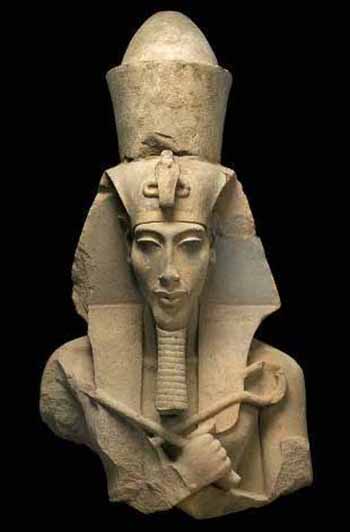 Akhenaten AkhenatenThe idea of Akhenaten as the pioneer of a monotheistic religion that later became Judaism has been considered by various scholars. One of the first to mention this was Sigmund Freud, the founder of psychoanalysis, in his book Moses and Monotheism. Freud argued that Moses had been an Atenist priest forced to leave Egypt with his followers after Akhenaten's death. Freud argued that Akhenaten was striving to promote monotheism, something that the biblical Moses was able to achieve. Following his book, the concept entered popular consciousness and serious research.  Head of a Statue of Akhenaton (unfinished), New Kingdom, ca 1340 BC Head of a Statue of Akhenaton (unfinished), New Kingdom, ca 1340 BCOther scholars and mainstream Egyptologists point out that there are direct connections between early Judaism and other Semitic religious traditions. They also state that two of the three principal Judaic terms for God, ( 1) Yahweh, ( 2) Elohim (morphologically plural, lit. " gods"), and ( 3) Adonai (lit. " My Lord" ) have a connection to Aten. Freud commented on the connection between Adonai, the Egyptian Aten and the Syrian divine name of Adonis as a primeval unity of language between the factions; in this he was following the argument of Egyptologist Arthur Weigall. Jan Assmann's opinion is that ' Aten' and ' Adonai' are not linguistically related. Ahmed Osman has claimed that Akhenaten's maternal grandfather Yuya was the same person as the Biblical Joseph. Yuya held the title " Overseer of the Cattle of Min at Akhmin" during his life. 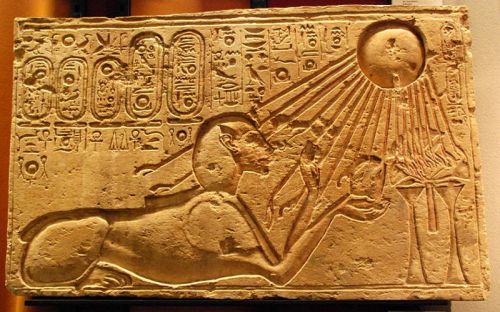 Akhenaten depicted as a sphinx at Amarna. Akhenaten depicted as a sphinx at Amarna. Sixth caliph of the Fatimids, Al-Hakim bi-Amr Allah Sixth caliph of the Fatimids, Al-Hakim bi-Amr AllahAnyway, the Druze accept as their own, the prophets of Judaism, christianity and Islam and respect Buddhism. It is a very interesting faith, culture and religion, because it is different than Islam, christianity and Judiasm, the three dominant Abrahamic religions in the Levant region ( Israel/Palestine, Lebanon and Syria). You can read more about them in the links below: Encyclopedia Britannica: www.britannica.com/topic/Druzeen.wikipedia.org/wiki/Druzeda.wikipedia.org/wiki/Drusere (For Karl in Danish) de.wikipedia.org/wiki/Drusen (For Karl, Kai and maybe Jaga in German) ru.wikipedia.org/wiki/%D0%94%D1%80%D1%83%D0%B7%D1%8B (For Eric in Russian) en.wikipedia.org/wiki/Druze_in_Israel / ru.wikipedia.org/wiki/%D0%94%D1%80%D1%83%D0%B7%D1%8B_%D0%B2_%D0%98%D0%B7%D1%80%D0%B0%D0%B8%D0%BB%D0%B5 (In Russian for Eric and other Russian readers) In Arabic for Arab guests of this Forum: ar.wikipedia.org/wiki/%D8%A7%D9%84%D8%AF%D8%B1%D9%88%D8%B2_%D9%81%D9%8A_%D8%A5%D8%B3%D8%B1%D8%A7%D8%A6%D9%8A%D9%84In Hebrew for Israeli visitors: he.wikipedia.org/wiki/%D7%93%D7%A8%D7%95%D7%96%D7%99%D7%9D_%D7%91%D7%99%D7%A9%D7%A8%D7%90%D7%9Cen.wikipedia.org/wiki/Druze_in_Lebanon / Cheers, Pieter P.S.- Maybe Karl with his Syria experience knows more about the Druze people, Druze culture and the Druze faith?Source: Wikipedia |
|
|
|
Post by pjotr on Jan 5, 2016 17:59:17 GMT 1
In Polish for Polish people over here and Polish diaspora people who read Polish. Druzowie Druzowie, Al–muwahhidūn (arab. دروز duruz hebr: דרוזים, " druzim") – grupa wyznaniowa i etniczna, która wyłoniła się z egipskiego isma'ilizmu w XI wieku na Bliskim Wschodzie. Wśród druzów popularna jest teoria, wedle której wywodzą się oni od biblijnego Jetro, teścia Mojżesza, który choć nie był Żydem, wspierał ten lud. Głównymi założycielami religii druzyjskiej byli Muhammad ibn Isma illa ad-Darazi i Hamza ibn Ali Ahmad. Sami wyznawcy nazywają siebie Muwahhidun. Darazyci - druzowie osiedlili się w północnej Syrii w 1017 roku. Obecnie największe skupiska druzów znajdują się w Libanie w pobliżu góry Hermon, w górach wokół Bejrutu i Sydonu. Mniejsze grupy zamieszkują w górach Hauran w Syrii i w Izraelu na Wzgórzach Golan. Ich liczebność ocenia się na około 500-600 tys. Druzowie odgrywają znaczącą rolę polityczną w Libanie, gdzie stanowią 8% populacji i obsadzają 8 miejsc w 128-osobowym parlamencie. Druzowie mieszkający w Izraelu są znani ze swojego patriotyzmu w stosunku do tego państwa, w związku z czym na równi z Żydami podlegają (poza szejkami - wtajemniczonymi w nauki) obowiązkowi służby wojskowej w izraelskiej armii (Siłach Obronnych Izraela), z której de facto zwolnieni są przedstawiciele innych mniejszości narodowych. Tworzą Druzyjski Oddział Zwiadowczy. Druzowie mieszkający w Syrii w toczącej się w tym kraju wojnie domowej zachowują neutralność. Religia druzyjskaWyznanie druzyjskie łączy cechy religii muzułmańskiej z wpływami chrześcijaństwa, gnostycyzmu oraz dawnych wierzeń bliskowschodnich. Ponieważ ich doktryna religijna, opierająca się na 111 traktatach (risala) odbiega znacząco od ortodoksji muzułmańskiej, przez wieki uważani byli za ruch heretycki, a nawet religię odrębną od islamu. Sprzyjał temu hermetyczny charakter wspólnoty (małżeństwa wewnątrz grupy, nie przyjmują nowych wyznawców), skrywanie wierzeń oraz niektóre specyficzne poglądy. Religia druzyjska jest monoteistyczna. Uznają oni fatymidzkiego kalifa Al-Hakima (zm. 1021) za inkarnację Boga, wierząc, że żyje on dalej w ukryciu. Uznają siedmiu nieomylnych i pozbawionych grzechów proroków, m.in. Adama, Abrahama i Jezusa. Wierzą w wędrówkę dusz (reinkarnację), która spełnia się gdy dusza jednoczy się z al-aaqal al kulli - Kosmicznym Umysłem utożsamianym z Wolą Bożą. Druzowie nie uznają pięciu filarów islamu. Wspólnota druzów dzieli się na dwie grupy: - ukkal (wiedzący, mędrcy) - dżuhhal (nieświadomi). Świętymi księgami są Qur'an - Koran, Nowy Testament i ich własne religijne pisma Kitab al-Hikma.  The star of the Druze people The star of the Druze people |
|
|
|
Post by pjotr on Jan 5, 2016 17:59:42 GMT 1
|
|
|
|
Post by pjotr on Jan 5, 2016 18:00:21 GMT 1
|
|
|
|
Post by pjotr on Jan 5, 2016 18:01:17 GMT 1
I showed the news about the execution of the Saudi Shia-Muslim cleric Nimr al-Nimr saturday afternoon to my Syrian Druze guest. His reaction; " Oh, no, oh my God, this is terrible, he is a good man. Why did they kill him, he was a peaceful demonstrator, not a violent man." " They are creazy, why did they do that? This doesn't help to improve the situation in the Middle east." My Syrian Druze guest was truely shocked. He looked at ' reliable Arab news sources', and had contact with his mother and other family members who are stil in the Druze city As-Suwayda and his brother in Damascus. They confirmed that Nimr al-Nimr was killed by the Saoudi's. All Shia in the Middle east (Arab countrries and Iran), in Africa and Afghanistan are very upset and angry.  The executed Saudi Shia-Muslim cleric Nimr al-Nimr The executed Saudi Shia-Muslim cleric Nimr al-NimrIran's religious leader Ali Khamenei spoke out against Saoudi-Arabia, Sayyed Hassan Nasrallah, Secretary General of the Lebanese political and paramilitary organization Hezbollah condemned the killing in strong terms. And Shia Muslims in Lebanon, Iraq, Bahrein, Iran, and other countries demonstrated against Saoudi-Arabia. The situation is very serious indeed. Nimr al-Nimr was not a terrorist or criminal. He fought for Shia rights in Saoudi-Arabia and more autonomy for the Shia region in Saoudi Arabia. Shia's are second class citizens in Saoudi-Arabia and hated by the strict and puritinical (Fundamentalist Islamist) Wahabi ( Salafist) Sunni-Muslim majority. Maybe that is why Saoudi-Arabia hates Syria. Syria is an allie of Iran and the regime is dominated by Allawites. Allawites are a Shia sect of Islam.  The image of Sheikh Nimr al-Nimr with his distinctive grey beard and turban has adorned placards and banners during protests in eastern Saudi Arabia for over a decade, if not longer, even if it is only the sentencing of his nephew, Ali Mohammed al-Nimr, to death and crucifixion that has catapulted the elderly Shia cleric onto the global stage. The image of Sheikh Nimr al-Nimr with his distinctive grey beard and turban has adorned placards and banners during protests in eastern Saudi Arabia for over a decade, if not longer, even if it is only the sentencing of his nephew, Ali Mohammed al-Nimr, to death and crucifixion that has catapulted the elderly Shia cleric onto the global stage.Cheers, Pieter P.S.- Although my Syrian Druze guest is an Arab himself, he is very critical of Arabs himself. He said about Arabs: Arabs always fought Arabs in the desert, in villages, towns and cities. They are divided in tribes and clans and always compete with eachother. One Arab can't trust another one. (with Arabs he mainly meant Sunni-Muslims, the majority of Muslims in the Middle-east) He said; "I am sorry to say this, but this is the truth. We Druze always lived side by side with our (Arab) Beduin Sunni-Muslim neighbours, they came into our homes as guests, we served them food and drinks, they could stay as guests -sleep over-, we gave them sweets and tea, our best meat, bread, vegetables and thus good dishes. And we were their guests and came into their homes and they treated us well as guests. It is in our culture that we have to be good to guests. But we can't trust them. Because one day they are our friend, the next day they can be our enemy. They support the Al Nusra Front (Al Qaida in Syria). Their wives and children live amongst us. We will not harm them. Their men (Fathers, sons, brothers, uncles, nephews) fight in Daraa and other places for the Al Nusra Front (Al Qaida). My Syrian friend even told me that the Syrian regime takes care of the families of opposition rebel fighters, because they are Syrian. The Syrian regime doesn't take care for foreign fighters and their families. The situation in Syria and the Middle-east is very complicated. It is not black and white like in the Western (European and American; BBC, Der Spiegel, WDR, ARD/ZDF, the Dutch NOS and RTL-Nieuws, Euronews, CNN, FOX news and ABC/CBS), Russian (RT) or Arab (Al Jazeera and Al Arabiya) press show it to us. Some families are split, some families are split between government and opposition supporters. And they stay in contact, because despite everything they are family. Next to black and white, you have grey and antracite (area's) and colours, and many different colors (like in the Rainbow and the Druze flag and star). We only see the Syrian army and the Islamists, but you have Nationalist, Democratic, communist (Marxist), secular opposition, Assyrian-Christian, Druze, socialist forces too and just civilian neighbourhood and village/town protection units (local/regional civilin self Defense forces, civilian militia). It is more complex, diverse and pluralistic than we read in the Western press. It is equally complicated as the Lebanese civil war.www.britannica.com/event/Lebanese-Civil-Waren.wikipedia.org/wiki/Lebanese_Civil_WarIn Polish: pl.wikipedia.org/wiki/Wojna_domowa_w_Libanie_(1975-1990)In Danish for Karl: da.wikipedia.org/wiki/Libanesiske_borgerkrig In German: de.wikipedia.org/wiki/Libanesischer_B%C3%BCrgerkriegIn Russian for Eric and Russian readers: ru.wikipedia.org/wiki/%D0%93%D1%80%D0%B0%D0%B6%D0%B4%D0%B0%D0%BD%D1%81%D0%BA%D0%B0%D1%8F_%D0%B2%D0%BE%D0%B9%D0%BD%D0%B0_%D0%B2_%D0%9B%D0%B8%D0%B2%D0%B0%D0%BD%D0%B5Arab: ar.wikipedia.org/wiki/%D8%A7%D9%84%D8%AD%D8%B1%D8%A8_%D8%A7%D9%84%D8%A3%D9%87%D9%84%D9%8A%D8%A9_%D8%A7%D9%84%D9%84%D8%A8%D9%86%D8%A7%D9%86%D9%8A%D8%A9Persian (Iranian Farsi): fa.wikipedia.org/wiki/%D8%AC%D9%86%DA%AF_%D8%AF%D8%A7%D8%AE%D9%84%DB%8C_%D9%84%D8%A8%D9%86%D8%A7%D9%86Hebrew: he.wikipedia.org/wiki/%D7%9E%D7%9C%D7%97%D7%9E%D7%AA_%D7%94%D7%90%D7%96%D7%A8%D7%97%D7%99%D7%9D_%D7%91%D7%9C%D7%91%D7%A0%D7%95%D7%9F_(1975-1990) |
|
|
|
Post by jeanne on Jan 5, 2016 21:45:26 GMT 1
Pieter,
What an interesting experience you have had with your visitor! Your postings here are just solid evidence of how incredibly complicated the situation in the Middle-east is!
I understand and agree with your friend's comments about the Western press and how they often do not report events truthfully or clearly which adds to the confusion. But after reading these postings, I see how difficult it must be to give a coherent report on exactly what is happening in Syria and its neighboring countries!
I do thank you for sharing all this with us. While I often have trouble keeping the various factions straight, I do feel that after reading what you have posted, I have learned more about the situation that I ever could from reading/listening to the usual media sources available to me. Speaking with someone who has first-hand knowledge of the situation from actually living through it (as you have had the opportunity to do) certainly is the best source of information.
Thanks, Pieter!
Jeanne
|
|
|
|
Post by Bonobo on Jan 5, 2016 22:14:41 GMT 1
1 The young man is a Syrian Druze from Southern-Syria. He is mildly Pro- Bashar Hafez al-Assad, and very anti-Daesh ( Islamic State), 2 I also learned that there is a difference between Syrian Druze, Israeli Druze and Lebanese Druze. Lebanese Druze are hostile towards Syrian Druze because they are Syrian. My Druze Syrian friend was honest and said that the Syrian army and intelligence agencies have played a bad role in Lebanon during the Lebanese civil war and after that. They assasinated, abducted, killed and bombed Lebanese people. I also talked with him about Walid Jumblatt, the Lebanese Druze leader. My Syrian Druze friend called Walid Jumblatt a strong leader but also a flip flop, switching sides often. Being fiercly anti-Syrian, then Pro-Assad, then moderately opposed to the Syrians and then Pro-Syrian again. Pieter 1 Yes, most of these refugees are not Islamic fanatics, quite the contrary, they are fleeing from fanatics. But the stereotypical view is that refugees want to come to Europe to blow it up in terrorist attacks. Many Poles think so. 2 Yes, Jeanne mentioned it is all so twisted there in the Middle East. I am afraid decades will have to pass so that people can live peacefully again in those territories. Thank you, Pete, for sharing this experience with us. As a teacher, I wonder if the man spoke good English. Could you understand him easily? |
|
|
|
Post by pjotr on Jan 6, 2016 0:05:55 GMT 1
My Druze friend from Syria speaks English poorly. It was quite a challenge to communicate sometimes. He used his smart phone a lot to translate words into English. But often wrong words came out. Sometimes 3 or 4 wrong words. Not what he ment to say. So it was complicated. But universal and cosmopolitan symbols, and historical people or things we could use. Greek, Roman, Faronic (Egyptian), Buddhist, Hindu, Muslim, Jewish and Christian philosophers, prophets and people were easy. Specific words, sentences and expressions were difficult. He comes from an Arab country in an Arab speaking region. Due to the secretive nature of his Druze faith he could say little (to nothing) about his faith. But he could say something about his people, and the differences and similarities between Syrian, Israeli and Lebanese Druze. Syrian Druze are segregated by the border between Syria and Israel on the Golan Heights. Syrian Druze therefor also live on the Israeli side of the border, and stil are loyal to Syria. A lot of them are Assad supporters. I remember that the Druze played a significant role during the Lebanese civil war. You had an Armed Druze militia of the Druze PSP (Progressive Socialist Party) party of Walid Jumblatt; the People’s Liberation Army – PLA. Some images of Lebanese Druze fighters during the Lebanese Civil War (1975-1990)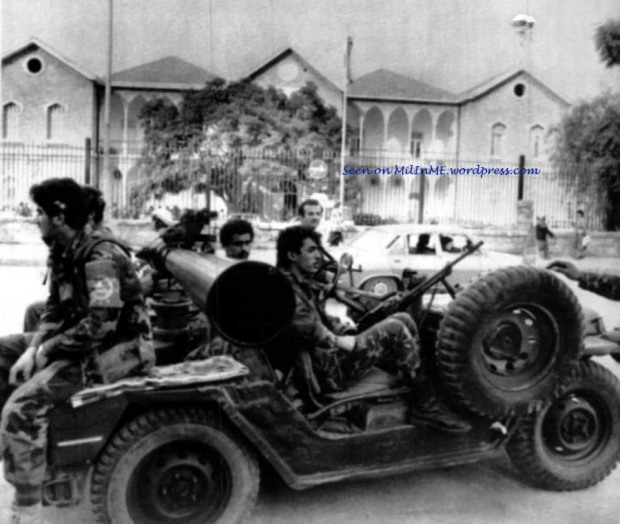   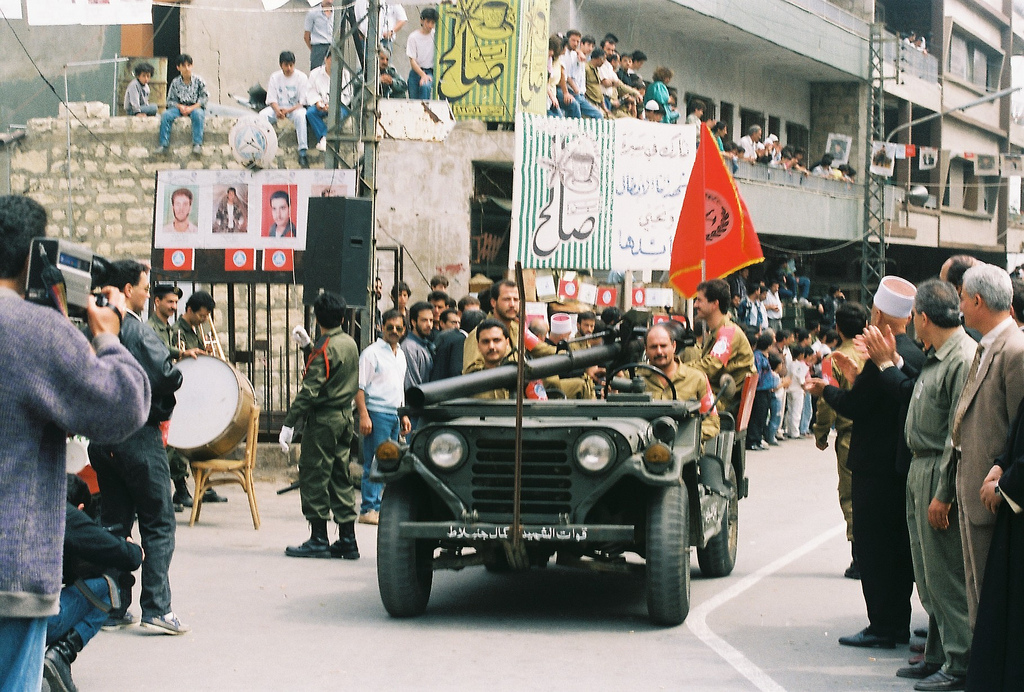 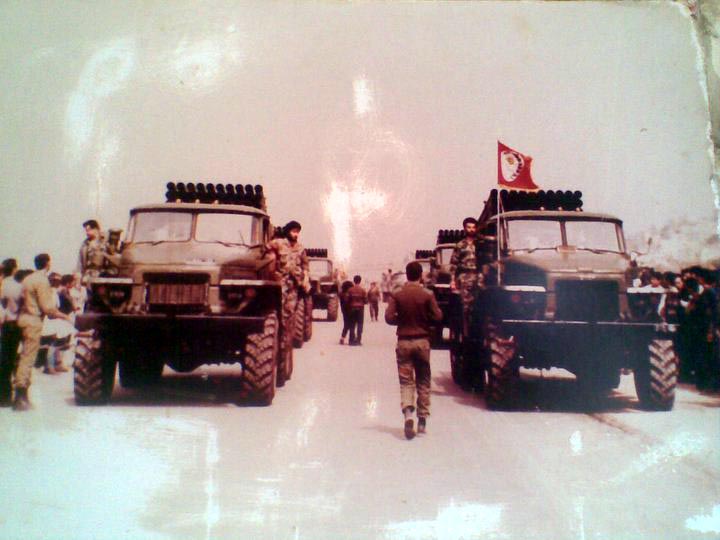 PSP armed militia BM-21s during a military Parade, 1980s. PSP armed militia BM-21s during a military Parade, 1980s.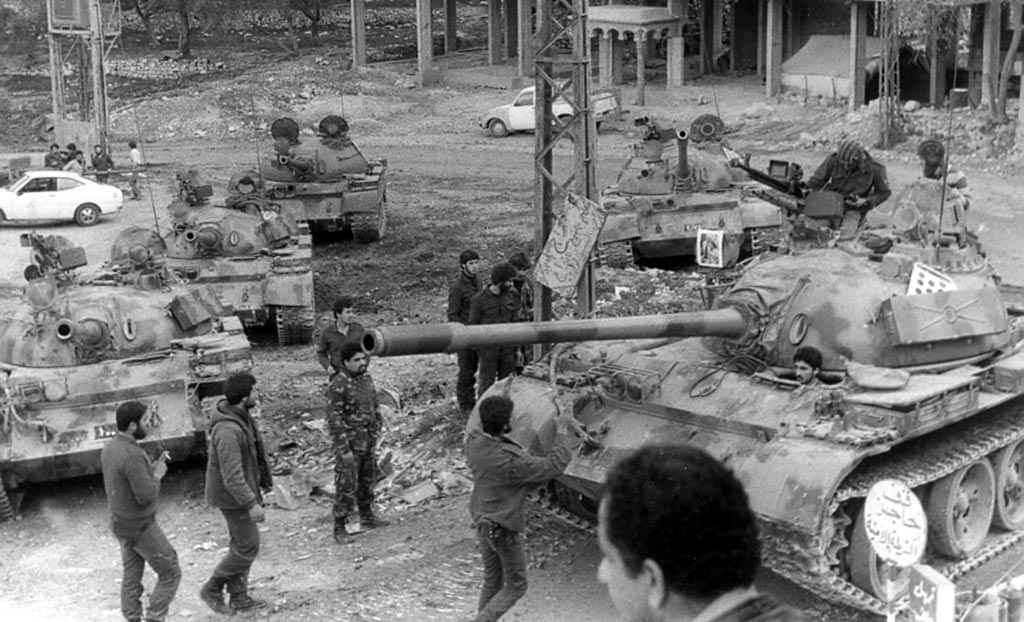 PSP armed militia T-55 MBTs, 1980s. PSP armed militia T-55 MBTs, 1980s. |
|
|
|
Post by Bonobo on Jan 6, 2016 0:23:52 GMT 1
I remember that the Druze played a significant role during the Lebanese civil war. You had an Armed Druze militia of the Druze PSP (Progressive Socialist Party) party of Walid Jumblatt; the People’s Liberation Army – PLA. Some images of Lebanese Druze fighters during the Lebanese Civil War (1975-1990)I looked at these photos, it is so sad how people have been trying to get rid of each other for so many years in that area. Decades must pass. |
|
|
|
Post by pjotr on Jan 7, 2016 0:27:25 GMT 1
Yes, it is sad. I remember a Lebanese girl (university student ) in Amsterdam who lived in the student home of my Amsterdam girlfriend (partner) in 1991. A really sweet, kind, gentle, sophisticated Dutch, French, English and Arab speaking girl of a Lebanese Christian (Maronite) family. I had a LAT relation with my girlfriend back than and stayed for 50% of my time in her home. At night (3/4 'o clock in the morning) sometimes I woke up, because I heard Bea (the Lebanese girl) screaming and crying. The poor young Lebanese woman was suffering from heavy nightmares of the Lebanese civil war, she had been exposed to as a child and teenager. Her childhood had been one of war, bloodshed, terror, constant shelling (artillery, rpg's, heavy machine guns on pick up cars and trucks, tank fire, explosions, snipers and etc.) she was suffering from a post-traumatic stress disorder. Two of my nineties and early 21th century girlfriends lived in that student home. Half of my private and social life was there. I learned a lot about the Lebanese civil war from Bea, who had experienced it herself. She lived somewhere close to the green line between the predominantly Christian East Beirut and the mainly Muslim factions in West Beirut. They were under constant fire of the Muslim side. The Shia Muslim Hezbollah movement, the Palestinians of the PLO Fatah militia, Sunni Muslim parties, and leftist communist militia that sided with the Muslims. Of course the Christian fighters of the Lebanese Forces, Phalange party, Kaeteb party and other Christian militia fought back. Many Christians sided with the Israeli's when they entered the civil war. Other Christians choose the side of Pro-Syrian fighters. Of course the Shia and Sunni Muslims of Lebanon were polarized too. Shia Muslims fought with the PLO. pro-Syrian Palestian fractions like the PFLP-GC and As-Sa'iqa ( en.wikipedia.org/wiki/As-Sa%27iqa ) fought vicious battles with Arafats Fatah PLO forces. The Shia Muslim movement Hezbollah clashed with the other Shia movement Amal in Southern-Lebanon. The Lebanese Druze of the PSP party and it's armed wing sided with Arafats PLO Fatah forces. The Druze and Maronite Christians fought battles about territory, especially Mount Lebanon. Our Lebanese fellow student Bea had suffered from war for nearly a decade before she could leave Lebanon due to Dutch family connections. The civil war had left mental scars on her soul. Memories of that time in Lebanese history were with her. Nightmares and panic (anxiety) attacks were part of her life. She was under psychological treatment. Special psychotherapy for trauma, cooping with loss and an angst disorder. I hope she is doing fine today. She was part of the student community over my girlfriends in that home. math students, Dutch language students, economy students, medicine students, and art teacher students like myself. It was a cultural, intellectual and dynamic time. We loved to go out and dance and go to the cinema to see French, Italian, Spanish, Czech, Polish, Russian (Tarkovski's Stalker and others), American Art a House Cinema movies, and also Israeli, Arab, Persian, Chinese and Japanese movies. All in the original language with Dutch subtitles. (That's one of the things I like about my country. I learned of the sound of foreign languages, and always saw the original movies. Not like the irritating movies on German or French tv with German and French voice overs. due to the Polish Decalogue series of films of Kieslowski I learned about the sound of Polish. I was to seldom in Poland to keep connection to Polish language and the sound of it. Via movies I felt Poland and stayed connected to memories of Poznan and Warsaw of the seventies). Unfortunately Bea's memories of Beirut and Lebanon were tragic and dark. But next to the grim reality of war, she also had idyllic romantic memories of a beautiful Lebanese countryside, where she used to visit her Maronite Christian grandparents, uncles, aunts, cousins, nieces and nephews. It was and is a beautiful country. It is sad that her childhood and youth (teenage years) were destroyed, disrupted and violated by that brutal, useless and criminal civil war. The mutual massacres of Christian, Palestinian and Lebanese Muslim (Shia Muslim and Sunni-Muslim, and Allawites) villages, refugee camps (Sabra and Shatilla) were terrible next to the destroyed homes, apartment blocks and residential area's by the tank fire, artillery, rpg's and heavy machine gun fire from puck up trucks and jeeps. And stil Lebanese people from all faiths, sects, ethnic groups and political affiliations can get along. The biggest danger is that the Syrian civil war will spread to Lebanon. In the Lebanese city of Tripoli Sunni and Allawite civilians clashed in a battle between two neighborhoods. Hezbollah Shia Muslim neighborhoods were the target for large bomattacks. On the Lebanese Syrian border Hezbollah clashed with the Al Nusra Front which infiltrates Lebanon from Syria. en.m.wikipedia.org/wiki/Lebanese_Civil_Waren.m.wikipedia.org/wiki/War_of_the_Campsen.m.wikipedia.org/wiki/Green_Line_(Lebanon)en.m.wikipedia.org/wiki/Black_Saturday_(Lebanon)en.m.wikipedia.org/wiki/Karantina_massacre#/searchen.m.wikipedia.org/wiki/Tel_al-Zaatar_massacreen.m.wikipedia.org/wiki/Damour_massacreen.m.wikipedia.org/wiki/Sabra_and_Shatila_massacreParties of the Lebanese civil war: Christians: en.m.wikipedia.org/wiki/Lebanese_Forces_(militia)en.m.wikipedia.org/wiki/South_Lebanon_Armyen.m.wikipedia.org/wiki/Tigers_Militia_(Lebanon)en.m.wikipedia.org/wiki/Al-Tanzimen.m.wikipedia.org/wiki/Kataeb_Regulatory_Forcesen.m.wikipedia.org/wiki/Guardians_of_the_Cedars#CreationThe leftist Lebanese National Resistance Front: en.m.wikipedia.org/wiki/Lebanese_National_Resistance_Fronten.m.wikipedia.org/wiki/Amal_Militiaen.m.wikipedia.org/wiki/HezbollahDruze: Progressive Socialist Party; Foreign powers: PLO (mainly Arafats Fatah movement and militia) Popular Front for the Liberation of Palestine (PFLP) Democratic Front for the Liberation of Palestine (DFLP) Syria ( Syrian Armed Forces) Iran (Iranian Revolutionary Guards helped found, equip and organize Hezbollah) Israel France USA United Nations (Unifil) Cheers, Pieter |
|

























